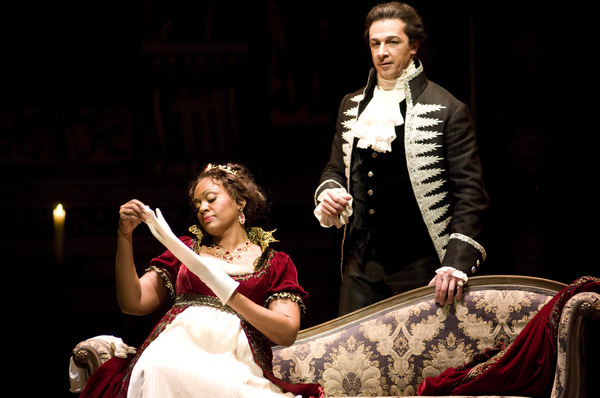
The lecherous Scarpia anticipates his conquest of Tosca. Wrong! Seattle Opera photo by Rosarii Lynch.
None of this stuff about "timeless" settings for Tosca: the story takes place in Rome over a specific, eventful weekend in June, 1800, as Napoleon's troops are invading Piedmont, on Italy's northern border.
The story, on the other hand, is a potboiler involving a beautiful opera singer, Tosca; a fugitive politician, Angelotti; a famous painter, Cavadarossi; and a villainous police chief, Scarpia. By the end of the opera, the genuine Napoleon has won, and all the fictional characters are dead. But, hey, that's entertainment!
As the cruel Scarpia, Greer Grimsley (who handled the same role in Seattle Opera's 2001 production) ain't no Hannibal Lecter; he's more like Heath Ledger's sauve and elegant Casanova. "Tosca, you make me forget God," he sings at the end of Act I. Then he orders the torture of Tosca's lover, Cavadarossi, because "violent conquest has more flavor." (Of course, as with any political story, there's the temptation to update it. Waterboarding, anyone?)
Soprano Lisa Daltirus sings the show-stopper aria Vissi d'arte ("I lived for art") as a lament to God: why are you doing this to me? (Hillary? I lived for politics?) Then she takes a knife from Scarpia's dining table and kills him. One down.
Oh, wait, Tosca has already given away Angelotti's hiding place; he kills himself to avoid capture. Two down.
Scarpia has supposedly given the order for a mock execution, but Cavadarossi is shot anyway. (That naughtly Scarpia! Duck-hunting Cheney?) Three down. When Tosca realizes what has happened, she leaps to her death from the castle parapet. Four down.
Our violent fantasies realized on a sumptuous stage, our nightmares played out to soaring music. That's grand opera for you: There Will Be Blood.
Seattle Opera presents Tosca, McCaw Hall, through March 9th. Tickets by phone (206-389-7676) or online.
Leave a comment